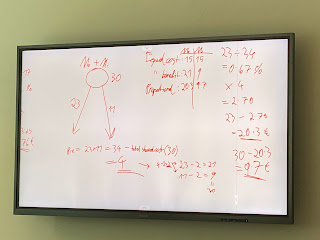World Politics Session 1 and 2
Today, we started the class with an introduction of the students and what they expect from the class. It was very interesting to briefly get to know our peer's political situation and background. Then, the professor went over the slides and explained the deadlines and expected outcomes from the classes. After class resumed, we had to choose and post our chosen country for the individual assignment and the professor then went into the theories and conceptual framework that will be useful for the coming classes and assignments. The conceptual framework (extended PESTEL) includes Geography, People and Society, Environment, Government, Economy, Energy, Communication, Transportation, Military and Security, Transnational Issues, and History. Then, we did a world quiz with the map with the whole class. Afterwards, we looked into the dominant and conflicting political and economic models that is being used such as socialism and the free-market capitalism. We went to the Human Prosperity Project page and were assigned a video to watch each to summarise. For background, the Human Prosperity Project examines the historical record to analyse the effects of various economic systems, ranging from pure socialism to free-market capitalism, on human welfare, individual liberty, and interactions between states.
Then, we watched a video and wrote a summary to discuss in class. I watched video number 4 and it is called The Modern Day Choice between Free Markets and Socialism: The video mentioned that China's economic progress has come at a significant cost to its citizens and neighbours and that the elites are having multiple residences and citizenship abroad and transferring money out of China, implying that they don't trust their own system. Moreover, despite its recent economic success, the video claims that China's neighbours do not regard it as a role model, and few countries are eager to adopt its socialist authoritarianism. Instead, these countries, such as Hong Kong and Taiwan, continue to look and rely on democracy and markets to provide universal wealth and stability.
Then after the break, we continued with the summaries of the videos, starting from Martin. Billy mentioned that socialism can be different for everyone, which made the professor question why and sparked the professor to share his experience when he was younger between East Germany and West Germany after the world war. I understand his experience. Many people may know about but during the 1970s, Khmer (the endonym for Cambodia) Rouge—as it is known now—is a name given to the Communist Party of Cambodia. Khmer Rouge came to power through a guerrilla war and happened between 1975-1979 and although there were many factors as to why it happened, Cambodia was on its way to socialism. Their motive was Khmer ultranationalism, agrarian socialism, State atheism, anti-intellectualism, racism, xenophobia, Year ZeroThe regime was known to be highly autocratic, totalitarian, xenophobic, paranoid and repressive. My parents lived through it as children and this topic still carries a heavy weight in their hearts so I can understand the sorrow and pain behind the experiences.
After everyone explained and summarised their parts, we dove into the types of government systems. There are different types of government systems such as Democracy Unitarianism (France) vs. Federalism], which are either [Direct (Switzerland), Representative (Germany) or Presidential (United States)], Republic (Turkey), Monarchy [Absolute (Oman) or Constitutional (Cambodia)], Elite [Aristocracy, Plutocracy, Kleptocracy, or Oligarchy (Russia)], and Totalitarianism (Communism, Theocracy, or Dictatorship, such as military or civilian). These are the government systems that we know of, but it can be even more complex.
Then, we answered questions assigned to us based on the Monarchy. Since my chosen country is Japan, I had to read a lot of details about Japan during its imperial times to the current era, so I am pretty much digesting a lot of information in a short time, but since I am choosing Japan for my individual assignment, I hope to be well-informed after some time and research.

Comments
Post a Comment